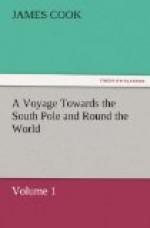At day-break the next morning, I sent the master in shore to sound the bay, and to find out a watering-place; at eight he returned, having found a most excellent harbour, clear ground from side to side, from eighteen to five fathom water all over the bay, gradually decreasing as you go in shore. We weighed and turned up into the bay; the wind being westerly, and very little of it, which baffled us much in getting in. At seven o’clock in the evening, we anchored in seven fathoms water, with a small bower, and moored with the coasting anchor to the westward, the north point of the bay N.N.E. 1/2 E. (which we take to be Tasman’s Head), and the easternmost point (which we named Penguin Island, from a curious one we caught there) N.E. by E 3/4 E.; the watering-place W. 1/2 N.; about one mile from the shore on each side; Maria’s Island, which is about five or six leagues off, shut in with both points; so that you are quite land-locked in a most spacious harbour.
We lay here five days, which time was employed in wooding and watering (which is easily got), and over-hauling the rigging. We found the country very pleasant; the soil a black, rich, though thin one; the sides of the hills covered with large trees, and very thick, growing to a great height before they branch off. They are all of the evergreen kind, different from any I ever saw; the wood is very brittle, and easily split; there is a very little variety of sorts, having seen but two. The leaves of one are long and narrow; and the seed (of which I got a few) is in the shape of a button, and has a very agreeable smell. The leaves of the other are like the bay, and it has a seed like the white thorn, with an agreeable spicy taste and smell. Out of the trees we cut down for fire-wood, there issued some gum, which the surgeon called gum-lac. The trees are mostly burnt or scorched, near the ground, occasioned by the natives setting fire to the under-wood, in the most frequented places; and by these means they have rendered it easy walking. The land birds we saw, are a bird like a raven; some of the crow kind, black, with the tips of the feathers of the tail and wings white, their bill long and very sharp; some paroquets; and several kinds of small birds. The sea-fowl are ducks, teal, and the sheldrake. I forgot to mention a large white bird, that one of the gentlemen shot, about the size of a large kite of the eagle kind. As for beasts, we saw but one, which was an opossom; but we observed the dung of some, which we judged to be of the deer kind. The fish in the bay are scarce; those we caught were mostly sharks, dog-fish, and a fish called by the seamen nurses, like the dog-fish, only full of small white spots; and some small fish not unlike sprats. The lagoons (which are brackish) abound with trout, and several other sorts of fish, of which we caught a few with lines, but being much encumbered with stumps of trees, we could not haul the seine.




